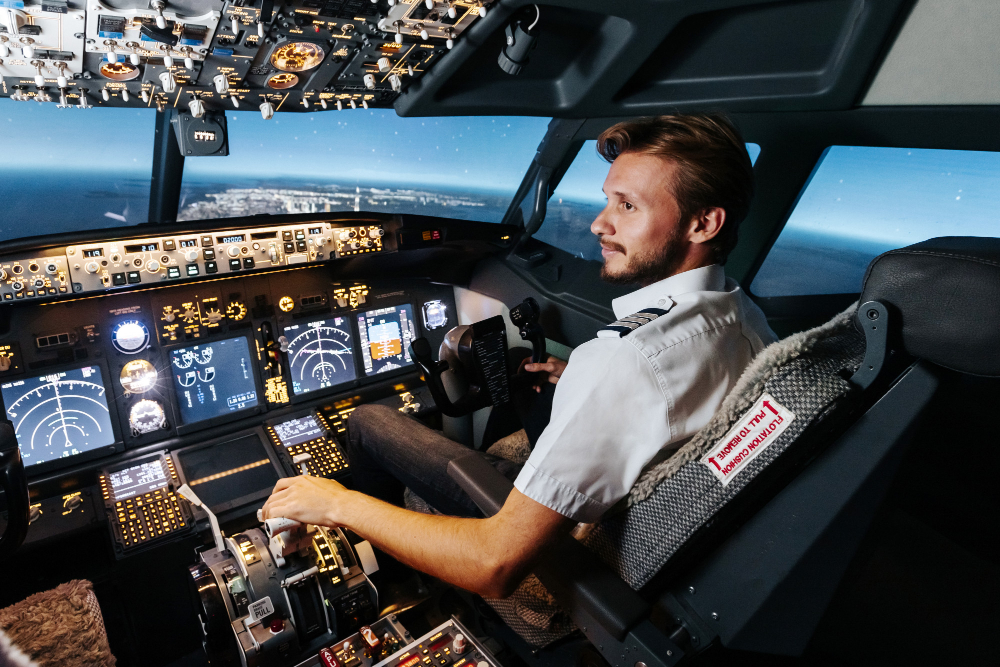
How to Become an Airline Pilot in the UK, USA, and Australia/NZ
Your step-by-step guide to flying high — no matter where you start.
Dreaming of soaring above the clouds, wearing that crisp uniform, and landing planes in cities around the world? Becoming an airline pilot is one of the most exciting and rewarding careers out there - but it’s also one of the most structured and technical paths.
The good news? Whether you’re in the UK, USA, Australia, or New Zealand, there are clear routes you can take. Here’s what you need to know.
What Does an Airline Pilot Do?
Airline pilots operate commercial aircraft, ensuring passengers (or cargo) travel safely and efficiently. It’s a role that requires:
-
Quick decision-making
-
Strong technical skills
-
Mental and physical stamina
-
Teamwork, leadership, and communication
Most airline pilots start as First Officers (co-pilots) and work their way up to Captain after several years of experience.
How to Become a Pilot in the UK
Step-by-Step Route:
-
Minimum Entry Requirements
-
Be at least 18 years old
-
GCSEs in English, Maths, and Science (A-Levels are a bonus)
-
Good physical and mental health (you’ll need a Class 1 medical certificate)
-
Choose Your Training Path
-
Integrated ATPL (Full-time course at a flight school, includes all training):
Takes ~18-24 months
Cost: £80,000–£120,000 -
Modular ATPL (Pay-as-you-go style training, more flexible):
Can take 2–5 years depending on pace
Cost: £50,000–£90,000 -
Pass the ATPL Theory Exams (14 subjects including navigation, meteorology, and flight planning)
-
Build Flying Hours
-
You’ll need a minimum of 200 hours to apply for an ATPL (Airline Transport Pilot Licence)
-
Get a Type Rating
-
Additional training for specific aircraft (often sponsored by the airline once you’re hired)
Top UK Flight Schools:
-
CAE Oxford
-
L3Harris Airline Academy
-
Leading Edge Aviation
-
FTA Global
How to Become a Pilot in the USA
Step-by-Step Route:
-
Start with a Private Pilot License (PPL)
-
Must be 17+ and pass an FAA medical exam
-
Progress to Commercial Pilot License (CPL)
-
Includes 250+ hours of flight time
-
FAA written and practical exams
-
Become a Certified Flight Instructor (CFI) (optional)
-
Many pilots build hours this way to reach the 1,500 flight hours required for major airlines
-
Get Your Airline Transport Pilot License (ATPL)
-
Required for flying as a captain or co-pilot in an airline
-
Must be at least 23 years old with 1,500 hours of flight time
Cost in the USA:
-
Total cost: $70,000–$100,000
-
Flight school programs, universities with aviation degrees, and airline cadet programs are all available
Top US Flight Schools:
-
Embry-Riddle Aeronautical University
-
ATP Flight School
-
CAE USA
-
Purdue University (Aviation)
How to Become a Pilot in Australia & New Zealand
Step-by-Step Route:
-
Start with a Recreational or Private Pilot License (RPL/PPL)
-
Must be 16+ (17+ for PPL), good health, and pass an aviation medical
-
Progress to Commercial Pilot Licence (CPL)
-
Requires 150+ flying hours
-
Includes theory exams and flight test
-
Can be done through integrated training or modular courses
-
Airline Transport Pilot Licence (ATPL) Theory
-
Sit ATPL exams early and complete flight hours later
-
Gain Experience and Build Hours
-
Flight instruction, charter flying, or regional work
-
Apply for Airline Roles
-
Often start as a First Officer on smaller routes and work up
Cost in Australia/NZ:
-
$80,000–$130,000 AUD/NZD
-
Government loans (like HECS) may be available for approved uni programs
✈️ Top Schools in Australia & NZ:
-
Basair Aviation College
-
UNSW Aviation
-
Massey University (NZ)
-
CAE Melbourne
-
Airways Aviation
Do I Need a University Degree?
In most countries, a degree is not essential - but it can be useful for:
-
Applying to airline cadet programs
-
Standing out in competitive job markets
-
Career progression into aviation management or training roles
Popular degrees include:
-
Aviation Management
-
Aerospace Engineering
-
Bachelor of Aviation (available in AUS/NZ)
Top Tips for Aspiring Pilots
✅ Research thoroughly – Visit flight schools, compare courses, talk to current students.
✅ Budget smartly – Training is expensive, so look into finance, loans, and scholarships.
✅ Stay fit and healthy – Medical requirements are strict, especially for commercial flying.
✅ Prepare mentally – The workload is intense, especially during ground school.
✅ Network early – LinkedIn, forums, open days, and expos are great for meeting industry professionals.
Career Outlook: What Happens After Training?
After qualifying, most pilots will:
-
Start in regional or charter airlines
-
Apply for airline cadet schemes or recruitment drives
-
Gradually progress to First Officer at a major airline, then Captain
-
Consider roles in flight training, airline management, or even aviation safety
Final Thoughts
|
Country |
Cost (approx) |
Flight Hours Needed |
Route Type |
|
UK |
£80k–£120k |
200+ |
Integrated or Modular |
|
USA |
$70k–$100k |
1,500 |
Modular + CFI |
|
Australia/NZ |
$80k–$130k AUD/NZD |
150+ (CPL), then more |
Modular or Integrated |
Becoming an airline pilot takes commitment, funding, and a lot of training - but for those who love flying and adventure, it’s one of the most rewarding careers out there.
If you’ve got the passion, the sky’s not the limit - it’s just the beginning.




